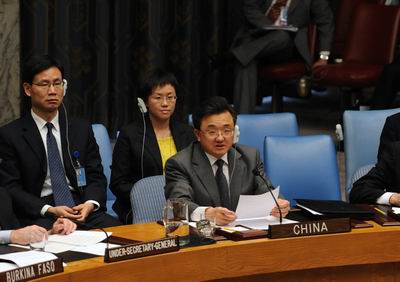| Statement by Ambassador Liu Zhenmin on Drug Control and International Security at Open Debate of the Security Council |
| 2009-12-08 06:33 |
|
Mr. President, At the outset, I thank Burkina Faso for initiating the open debate in the Security Council on drug control under the agenda item “Peace and Security in Africa”. I would like to thank you for coming to New York to chair this debate and welcome the presence and statements of Secretary-General Ban Ki-moon and Executive Director Costa.
(Photographer: Bai Jie/Xinhua News Agency) Mr. President, The Outcome Document of the World Summit held in 2005 emphasizes that drugs, transnational crimes and terrorism pose a negative impact on global development, peace, security and human rights, and the international community should take collective action to tackle these problems. This fully demonstrates the great importance the international community attaches to resolving the issue of drugs. However, the drug problem is still spreading in some parts of the world, and has even become one of the acute problems threatening peace and stability of these regions. This is particularly the case in West Africa. In recent years, the Security Council has been briefed repeatedly by officials in charge of UN West African regional offices and the UNODC. Today’s open debate in the Council on West Africa’s efforts to counter narcotic drugs under agenda item “Peace and Security in Africa” is of particular relevance. Mr. President, Drug trafficking is the main reason behind the extensive spread of drugs in today’s world. Combating drug trafficking requires strengthened international cooperation. As indicated by the briefings to the Council over the time by the Secretariat and the UNODC, there is a drug trafficking channel spanning from Latin America to West Europe and North America via West Africa. Making use of the weak government control in some West African countries, international drug traffickers use West Africa as transit, and the countries in the region fall victim as a result. This has not only led to organized crimes, but also affected the social stability and security of the relevant countries. As is true with any consumer good, consumption gives rise to demand, and demand generates a market and stimulates production. As a special consumer good, narcotic drugs are no exception. Due to the existence of a relatively stable consumer market for drugs in some developed countries, international drug trafficking groups, prompted by huge profit, go to any lengths to organize drug production and trafficking. The areas that serve as origin of production or route are often economically underdeveloped regions. Therefore, the fight for international drug control must depend on international cooperation and adhere to the principle of “shared responsibility”. West African countries should strengthen legislation and law enforcement, and crack down hard on international drug trafficking. The developed countries, where drug consumption mainly takes place, have strong capacity for government control, and are duty-bound to shoulder the moral responsibility for eliminating drug consumption, and make concrete contribution to advancing the international fight against drugs. Mr. President, In international cooperation on drug control, the role of regional organizations which are at the forefront should be brought to full play. In recent years, the Security Council has, on many occasions, heard Mr. Costa’s briefings on drug problem in West Africa. We are deeply concerned about the grave situation relating to the issue. Some West African countries have just extricated themselves from wars and conflicts. They face difficulties in economic development, youth employment, rule of law capacity building, and are susceptible to inroads by international drug traffickers. In some situations, drug trafficking has even inflamed the conflicts in the countries concerned and posed a grave threat to the peace and stability of the West African region. The concern of the international community over the peace and security in this region should be translated into concrete measures to help West African countries and the regional organizations, such as ECOWAS, strengthen their anti-drug capacity building, including government monitoring and control capacities, as well as judicial and military capacities against drug crimes. The international community should help the West African countries develop their economies gradually, create job opportunities and improve the livelihood of their peoples so as to raise the awareness and capabilities of young people to say no to the temptation of drugs. This is the fundamental way and also the only way that the international drug control can make a real difference. Mr. President, The international drug control endeavors call for an even stronger UN role in communication and coordination. At present, the GA, ECOSOC, and UNODC have done a great deal of work in fighting global drug trafficking and have made much progress. However, given the grave situation of the spread of drugs, the international efforts are far from adequate. Drug crimes are a malignant tumor on the body of the human society. The fight against drugs therefore is a noble life-saving cause. The United Nations, as a major forum for promoting international cooperation and safeguarding world peace, should play a bigger role in this field. We support the relevant UN functional bodies in continuing discussions on this subject and hope that the Security Council will continue to give its attention to the work in this area. Thank you, Mr. President. |
| |||||||||||||
| |||||||||||||
